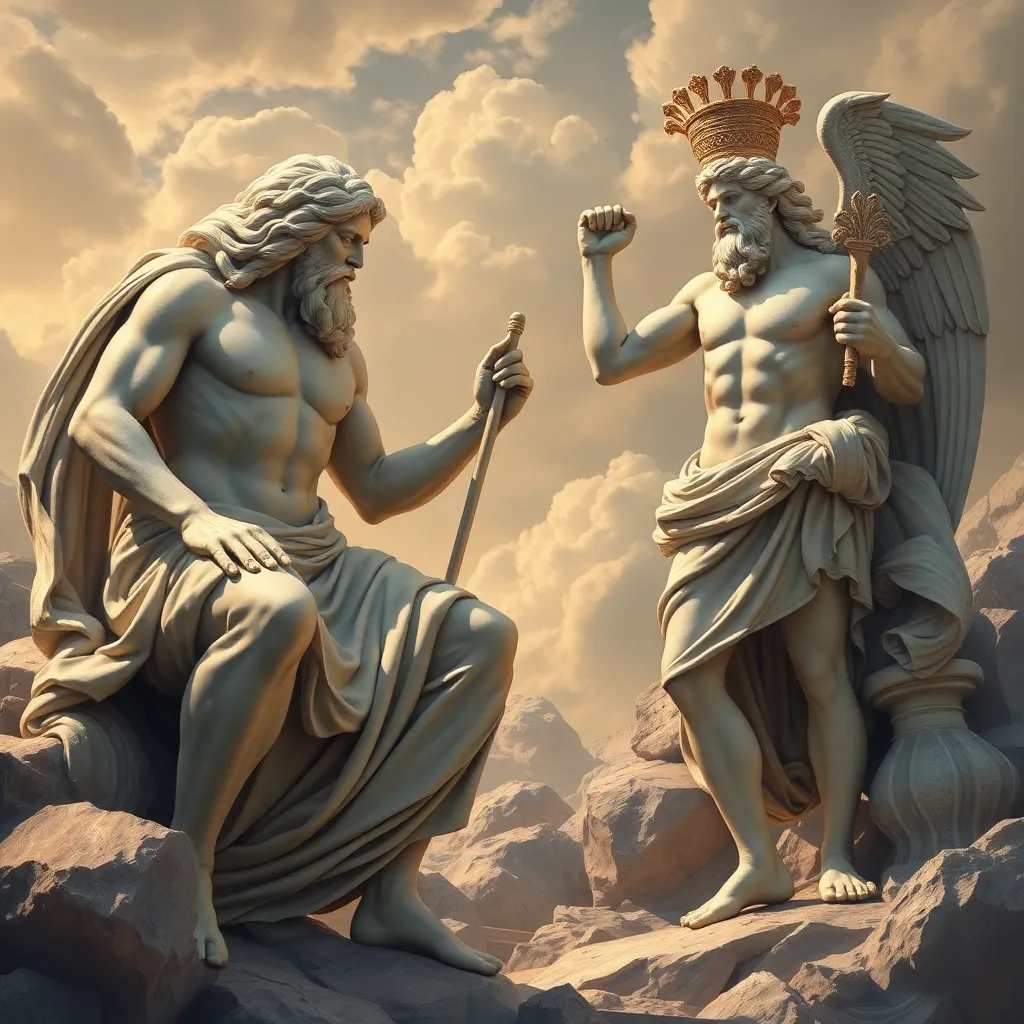The Relationship Between Zeus and Hermes: God of Messengers
I. Introduction
Greek mythology is a rich tapestry of gods, goddesses, heroes, and creatures that have shaped the cultural and religious landscape of ancient Greece. At the center of this pantheon is Zeus, the king of the gods, whose authority and power are unrivaled. Alongside him is Hermes, the god of messengers, travelers, and thieves, known for his cunning and speed. This article explores the intricate relationship between Zeus and Hermes, examining their dynamics and the significance of their roles in Greek mythology.
II. The Role of Zeus in Greek Mythology
Zeus, the son of Cronus and Rhea, is the chief deity in Greek mythology, known for his formidable attributes and powers.
- Attributes: Zeus is often depicted with a thunderbolt, symbolizing his control over the sky and weather.
- Powers: He has the ability to create storms, hurl lightning bolts, and exercise authority over both gods and mortals.
As the ruler of Mount Olympus, Zeus holds significant importance as a deity. He governs justice, law, and social order, making him a central figure in many myths.
Key myths involving Zeus include:
- The Titanomachy, where he leads the Olympian gods against the Titans.
- The story of Prometheus, where Zeus punishes the Titan for giving fire to humanity.
- The countless affairs he has with mortal women, resulting in numerous demigods and heroes.
III. The Role of Hermes in Greek Mythology
Hermes, the son of Zeus and the nymph Maia, embodies a multifaceted persona within Greek mythology.
- Attributes: Hermes is often depicted wearing a winged hat and sandals, representing his swiftness and agility.
- Domains: He is the god of travelers, commerce, and trickery, as well as the guide for souls to the underworld.
In his role as a messenger, Hermes serves as a vital link between the gods and mortals. He navigates the boundaries between the divine and human realms, ensuring communication and swift delivery of messages.
Key myths and stories featuring Hermes include:
- The tale of his birth, where he steals Apollo’s cattle shortly after his birth.
- Assisting Persephone by guiding her back from the underworld.
- His role in the Trojan War, where he aids various heroes and gods.
IV. The Dynamic Between Zeus and Hermes
The relationship between Zeus and Hermes is characterized by mutual reliance and collaboration. Zeus, as the king of the gods, often relies on Hermes for his swift communication and execution of tasks.
Hermes serves as a crucial intermediary, delivering messages from Zeus to other gods and mortals. Their dynamic can be seen in several instances throughout mythology:
- Zeus entrusts Hermes with the task of guiding souls to the underworld.
- Hermes often acts as a mediator in conflicts, communicating Zeus’s will to those involved.
- In the myth of the Trojan War, Hermes is sent by Zeus to assist and protect various characters, showcasing their collaborative efforts.
V. Symbolism of Their Relationship
The relationship between Zeus and Hermes symbolizes the balance of authority and communication within the framework of Greek mythology. Zeus represents supreme authority, while Hermes embodies the principles of communication and service.
This dynamic reflects several key themes:
- Authority vs. Communication: Zeus’s rulership is complemented by Hermes’s ability to convey messages and enforce the will of the king.
- Balance of Power: Hermes’s service to Zeus exemplifies the importance of loyalty and duty among the gods.
- Greek Values: Their relationship underscores the cultural significance of communication and the respect for authority in ancient Greek society.
VI. Key Myths Illustrating Their Relationship
Several myths highlight the intricate relationship between Zeus and Hermes, showcasing their interactions and the balance of their powers.
- The Birth of Hermes: Hermes’s early exploits, including his theft of Apollo’s cattle, demonstrate his cleverness and resourcefulness, earning him a unique place among the gods.
- The Cattle Theft: This story illustrates Hermes’s cunning nature and his ability to outwit even the mighty Apollo, which ultimately leads to his reconciliation with Zeus.
- Assisting Zeus: In various myths, Hermes assists Zeus in maintaining order among the gods and mortals, reinforcing the significance of their partnership.
VII. Cultural Impact and Legacy
The relationship between Zeus and Hermes has had a profound influence on literature and art throughout history. Their dynamic has inspired countless works, from ancient texts to modern adaptations.
In literature and art, their bond is often portrayed with themes of communication, authority, and the complexities of divine relationships:
- Literature: Various ancient playwrights and poets have explored their interactions, emphasizing the duality of power and communication.
- Modern Adaptations: In contemporary films and novels, Zeus and Hermes continue to be depicted, often reflecting modern themes of leadership and guidance.
- Legacy: Their relationship remains significant in understanding Greek mythology, embodying values that resonate even in today’s society.
VIII. Conclusion
The relationship between Zeus and Hermes is a compelling aspect of Greek mythology, illustrating the themes of authority, communication, and collaboration. Their dynamic reflects the importance of both power and service in ancient Greek culture.
As we explore the themes of communication and authority in mythology, it becomes clear that the bond between Zeus and Hermes is not only foundational in the context of ancient beliefs but also relevant to contemporary interpretations of divine relationships.
Ultimately, the dynamic between these two gods offers valuable insights into the complexities of power and the vital role of communication in both the divine and human realms.




